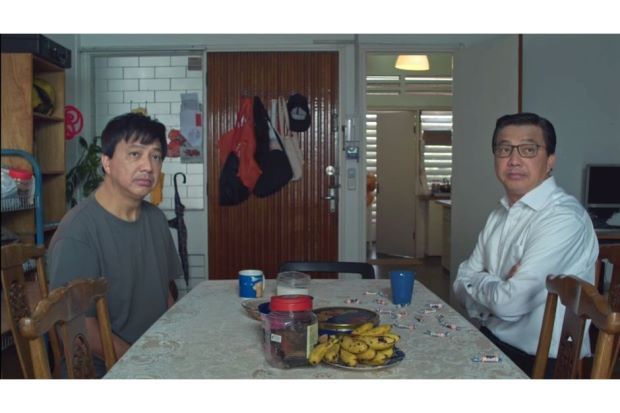
A scene of "Citizen Liow".
A National Day video has sent out a stark reminder to all that we must work towards making Malaysia a better home for all.
NO MCA politician has generated this kind of buzz on social media. The last one who set the Internet on fire, a parliamentary candidate who contested the Bukit Bintang constituency in the last general election, did so with an embarrassing bit of footage.
It was so stirring to the senses that the clip wormed its way into newsfeeds of foreign television stations, at the expense of poor, unsuspecting viewers.
So, it was unprecedented when a video – featuring MCA president Datuk Seri Liow Tiong Lai as a minister, citizen and husband – of this nature generated more than 200,000 views over the last four days, the number still on the rise.
The MCA has sometimes found it difficult to ignite the imagination of the Chinese community. Perhaps, the job of rubbishing the Government is more appealing to the reading, listening and viewing public. Truth be told, it is easier to do that than explain and defend government policies. No surprises then why MCA leaders often end up preaching to the converted, ie, their own party members at its ceramah.
But that changed last week. The six-minute National Day clip has become the talk of the town. It caught on so well that it exceeded the views of videos of the recent SEA Games KL 2017, on YouTube on Aug 30.
In the video, Liow, portrays himself as the Transport Minister engaged in an honest conversation with a citizen (a double act of himself), who is distinctly disgruntled by the way the country is being run.
It is Liow like we have never seen before – the citizen version of him, shabby, dispirited and a little rude, even.
“Citizen Liow” vents his frustrations, echoing the country’s current mood, and brings up the demeaning “balik tongsan” remarks and endemic corrupt practices, among others. At one point, he even throws a fistful of “rabbit” sweets at the minister in his home. The on-screen sparring between both Liows is brutally frank, mirroring the general sentiments of the local Chinese community.
Professional filmmakers, Pete Teo and Liew Seng Tat, have done a truly respectable job for Liow in addressing issues confronting the community. To call this short film a piece of propaganda is surely missing the deep-rooted points presented.
Come to think of it, not once were words like MCA, Barisan Nasional, One Malaysia or unity, so associated with Liow and other Cabinet members, ever uttered. This National Day, no one was asked to be grateful to the Government.
In fact, we should have reminded the elected leaders to be grateful to the people, instead, for placing them in those lofty positions in the first place.
At a time when politicians are put under the microscope, their every move scrutinised, Liow has taken a fresher route. He has addressed and opted to deal with issues that have not only bothered, but hurt the community for the longest time.
It is pointless telling the Chinese that Malaysia is their home, only to have extremist groups heckle them to “go back to China”. Inexplicably, these groups seem to enjoy unparalleled immunity and are spared any kind of punishment for their public display of disdain.
Liow has attempted to grab the bull by the horns, as depicted in this video, as he genuinely admits his failings and shortcomings, conceding that he could have done more for the community, but was crippled by stinging criticism of how the country is increasingly being divided by race and religion.
He has chosen a difficult subject, one which Malaysians prefer to grumble about within the community or in hushed tones, and certainly not at a time when the country celebrates its 60th year of independence, with flag-waving initiatives aplenty.
In fact, the MCA president’s throw of the dice has paid off, and quite handsomely, too.
A writer on a pro-Malaysiakini forum, known for its critical MCA stance, said “the MCA president has never ever before experienced this level of publicity. This scares many groups of people.”
“For his opponents, the enemy whom they deemed ‘inconsequential’ suddenly has access to a large audience. The opposition has gone into defence mode by attacking. As they unleash their trolls and attempt unlettered interpretations of what is basically a film calling for national unity and hope, they shame themselves by taking a tribal hardline to a non-partisan message.”
The writer added that “the video tugged at the heartstrings even. People of all races have seen it as a unifying force. It has created a greater understanding of how the Chinese in Malaysia feel, and imparts the importance of understanding each other’s grouses if we want to heal the nation.”
The reality is, Malaysia is our home. There is no other place for us. Not Indonesia, Saudi Arabia, China or India. As Martin Luther King Jr said, we came in many ships but we are now in the same boat. For better or worse, we have been brought together by destiny and we must work to make Malaysia a better place to live in.
Criticising the government of the day is fine, but running the country down is unacceptable because politicians come and go, but not our country. Our home stays the way it always has. And who else to better take care of her than us?
Liow, in this National Day season, has sent us this reminder, particularly to the Chinese community.
It is easier to be the champion of a particular community by ramping up the single-race rhetoric, but much harder to balance the demands of the ethnic groups which make up Malaysia.
But because we have practised a culture of understanding and acceptance, there is no reason why this shouldn’t continue to work. After all, Malaysia is about all of us.





